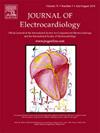In the face of confounders: Atrial fibrillation detection – Practitioners vs. ChatGPT
IF 1.3
4区 医学
Q3 CARDIAC & CARDIOVASCULAR SYSTEMS
引用次数: 0
Abstract
Introduction
Atrial fibrillation (AF) is the most common arrhythmia in clinical practice, yet interpretation concerns among healthcare providers persist. Confounding factors contribute to false-positive and false-negative AF diagnoses, leading to potential omissions. Artificial intelligence advancements show promise in electrocardiogram (ECG) interpretation. We sought to examine the diagnostic accuracy of ChatGPT-4omni (GPT-4o), equipped with image evaluation capabilities, in interpreting ECGs with confounding factors and compare its performance to that of physicians.
Methods
Twenty ECG cases, divided into Group A (10 cases of AF or atrial flutter) and Group B (10 cases of sinus or another atrial rhythm), were crafted into multiple-choice questions. Total of 100 practitioners (25 from each: emergency medicine, internal medicine, primary care, and cardiology) were tasked to identify the underlying rhythm. Next, GPT-4o was prompted in five separate sessions.
Results
GPT-4o performed inadequately, averaging 3 (±2) in Group A questions and 5.40 (±1.34) in Group B questions. Upon examining the accuracy of the total ECG questions, no significant difference was found between GPT-4o, internists, and primary care physicians (p = 0.952 and = 0.852, respectively). Cardiologists outperformed other medical disciplines and GPT-4o (p < 0.001), while emergency physicians followed in accuracy, though comparison to GPT-4o only indicated a trend (p = 0.068).
Conclusion
GPT-4o demonstrated suboptimal accuracy with significant under- and over-recognition of AF in ECGs with confounding factors. Despite its potential as a supportive tool for ECG interpretation, its performance did not surpass that of medical practitioners, underscoring the continued importance of human expertise in complex diagnostics.
面对混杂因素:房颤检测-从业人员vs. ChatGPT。
房颤(AF)是临床实践中最常见的心律失常,但医疗保健提供者对其解释的担忧仍然存在。混杂因素导致假阳性和假阴性房颤诊断,导致潜在的遗漏。人工智能的进步在心电图(ECG)解释方面显示出希望。我们试图检验具有图像评估功能的ChatGPT-4omni (gpt - 40)在解释混杂因素的心电图时的诊断准确性,并将其表现与医生的表现进行比较。方法:将20例心电图分为A组(房颤或心房扑动10例)和B组(窦性或其他心房节律10例),制作选择题。共有100名从业人员(分别来自急诊医学、内科医学、初级保健和心脏病学各25人)被要求确定潜在的心律。接下来,gpt - 40分五次进行提示。结果:gpt - 40表现不佳,A组平均3(±2)分,B组平均5.40(±1.34)分。在检查全部心电图问题的准确性时,gpt - 40、内科医生和初级保健医生之间没有发现显著差异(p分别= 0.952和= 0.852)。心脏科医生的表现优于其他医学学科和gpt - 40 (p结论:gpt - 40在混杂因素的心电图中对房颤的识别明显不足和过度,准确性不理想。尽管它有潜力作为心电图解释的辅助工具,但它的表现并没有超过医生的表现,这强调了人类专业知识在复杂诊断中的持续重要性。
本文章由计算机程序翻译,如有差异,请以英文原文为准。
求助全文
约1分钟内获得全文
求助全文
来源期刊

Journal of electrocardiology
医学-心血管系统
CiteScore
2.70
自引率
7.70%
发文量
152
审稿时长
38 days
期刊介绍:
The Journal of Electrocardiology is devoted exclusively to clinical and experimental studies of the electrical activities of the heart. It seeks to contribute significantly to the accuracy of diagnosis and prognosis and the effective treatment, prevention, or delay of heart disease. Editorial contents include electrocardiography, vectorcardiography, arrhythmias, membrane action potential, cardiac pacing, monitoring defibrillation, instrumentation, drug effects, and computer applications.
 求助内容:
求助内容: 应助结果提醒方式:
应助结果提醒方式:


